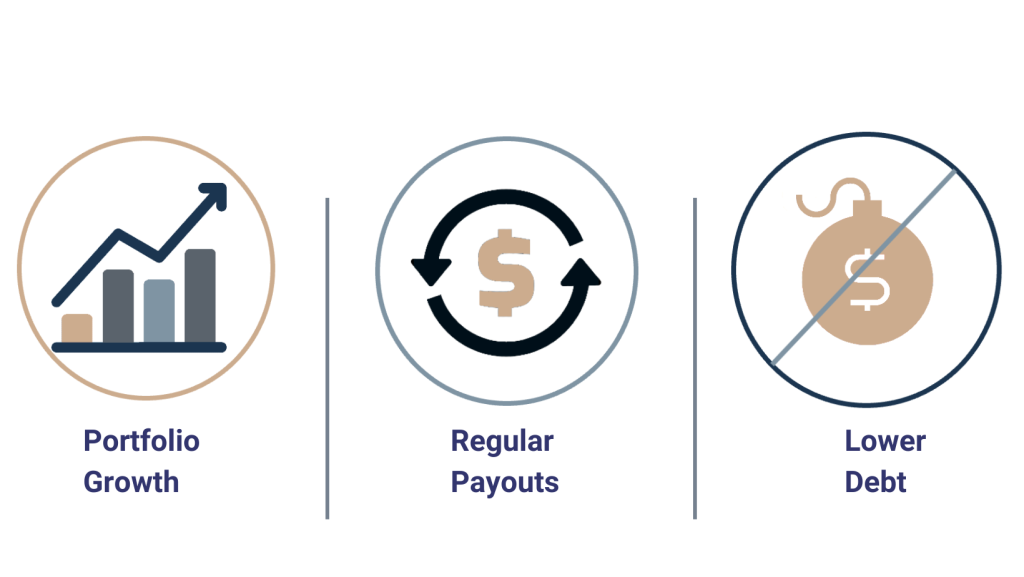Dividend-paying equities, or dividend stocks, can offer an attractive income supplement option and improve portfolio growth potential for many investors at any stage. If you’re years from retirement, for example, you can reinvest dividends to help boost your returns. At Miser Wealth Partners, our experts are extremely knowledgeable on dividend paying equities and helping our clients choose the most beneficial route for their investment.
What are dividend-paying equities?
Dividend-paying equities are stocks that distribute a portion of a company’s profits to shareholders on a regular basis, either monthly, quarterly, or annually. In other words, they’re a reward paid to shareholders for their investment in a company’s equity. For the sake of simple math, consider a company that pays an annual 2% dividend on shares traded at $100. At $2 per share (2% of $100), an investor with 100 shares would receive an annual dividend of $200 ($2 x 100 shares).
Most dividend stocks in America pay investors a set amount each term, and some of the top ones increase their payouts over time. Investors can choose to reinvest their dividends if they don’t need the stream of income sooner. Some companies may still offer dividend payments even when they don’t make suitable profits. As a rule of thumb, dividend-paying equities should not be considered a replacement for a traditional fixed income but more so as complement to a diversified portfolio.

Why do companies offer dividends?
Shareholders often expect dividends as a reward for their investment in a company, and dividend payments help maintain an investor’s trust. A high-value dividend can reflect positively by indicating that the company is doing well and generating good profits. A reduction in dividend payouts may not necessarily mean bad news, however. That could mean the company has plans to invest more money for growth, which could potentially increase shareholder returns down the road.
How is the payout amount for dividend stocks determined and how are they paid out?
The amount of dividend payments is determined by the company’s board of directors. They must agree to issue a dividend and on the specific amount to be paid out. Dividend payments can be issued in the form of cash, stock shares, or reinvestment programs. If you receive cash, it usually goes into your investment account and can be withdrawn or used to grow your portfolio. If you choose to receive stock dividends, you’ll get extra shares of the stock you hold. Some companies offer dividend reinvestment programs where you earn dividends and reinvest them back into the company. In addition, some companies have lower payout amounts but pay out more frequently, like every quarter instead of every year.
How are dividend-paying equities taxed?
The rate at which dividend-paying equities are taxed depends on how long you’ve been a shareholder and the type of account the dividend stocks are in. Qualified dividend-paying equities are taxed at the long-term capital gains rate, which is 0%, 15%, or 20%, depending on your income. Nonqualified dividends will be taxed at the short-term capital gains rate, which is the same tax rate as your regular income (ranging anywhere from 10% to 37%, depending on the income).
Should I reinvest my dividends?
If you have several years until your retirement, reinvesting may produce higher yields. For instance, a portfolio that reinvested its dividends over the course of 30 years generally far outpaced one that did not. Hypothetically, a $10,000 investment in an S&P 500 index fund in 1993 would have swelled to more than $158,000 by the end of 2022 had the dividends been reinvested. Had they not been reinvested, that amount would only have been about $88,000.
How do dividend-paying equities differ from stocks?
Dividend-paying equities are stocks; they’re just stocks that make regular payouts to shareholders. Stocks aren’t required to make dividend payments. Regular dividends don’t necessarily mean that a particular stock is a worthy investment. However, the regular payouts from dividend-paying equities can be an attractive option for providing a potential steady stream of income, especially for retirees.
What about dividend-paying equities and inflation?
As we all know, high inflation erodes purchasing power. In that case, your dividends must be greater to stay ahead of rising prices. Low inflation, on the other hand, puts less pressure on your income. As a result, you’ll want your dividends to exceed (or at least keep up with) the current rate of inflation.
What should I look for when choosing a dividend-paying equities?
When investing in dividend stocks, many experts recommend looking for three attributes:
- A history of steady dividend growth
- A low payout ratio
- A respectable current dividend rate
Not only may these characteristics help you identify worthy dividend investment options, but companies exhibiting these attributes tend to be higher quality with lower leverage and debt. That could potentially aid in weathering a downturn. The advisors at Miser Wealth Partners have access to numerous resources to help you decide in the best dividend option for your portfolio.
What’s my next step to regular income from dividend-paying equities?
While there’s no such thing as a perfect investment option, having a trusted partner to lead you every step of the way can ease any uncertainties. If dividend-paying equities sound like a viable option for you, we’d love to have a discussion and help you decide the best route to take. Call us at (865) 281-1616 or click here to set up a convenient time to meet with one of our skilled financial planners.


